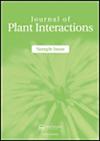Cu and Zn Stress affect the photosynthetic and antioxidative systems of alfalfa (Medicago sativa)
IF 3.3
3区 生物学
Q2 PLANT SCIENCES
引用次数: 2
Abstract
ABSTRACT Cu and Zn are common and potentially harmful heavy metals to plants, animals and humans. Herein, we investigated the effects of Cu and Zn stress on the photosynthesis and tolerance mechanism of alfalfa plants to ROS using fluorescence and biochemical methods. The results showed that Cu stress significantly reduced the chlorophyll content of the leaves, while Zn stress only reduced the Chl a content. The F v/F m decreased significantly under Cu stress but was not affected by Zn treatment. However, the PI ABS of the leaves were sensitive to Cu and Zn stress. Both Cu and Zn stress resulted in the weakening of the ability of PQ library to accept electrons, the damage of OEC and the inhibition of the electron transfer from QA - to QB. Moreover, Cu stress also dissociated the thylakoids of leaves, but Zn stress did not significantly damage it. In Cu and Zn stressed leaves, the reduction of RC/CS m significantly increased the ABS/RC and TR o/RC values. When the stress intensified, the value of DI o/RC increased indicated a plant self-protection mechanism that eliminates excess energy in the PSII reaction center and increases the energy for heat dissipation per unit reaction center. Cu stress significantly increased the O2 - production rate, H2O2 content, and MDA accumulation in the leaves. However, Zn stress exhibited a minimal effect on the ROS production and oxidative damage in the alfalfa leaves but increased the O2 - production rate at the concentration of 800 μmol·L−1. Cu stress increased the activities of SOD, POD, CAT, APX, and GPX in the leaves; however, leaves adapts to Zn stress by enhancing the activities of SOD and GPX. Thus under Cu stress, the degree of photoinhibition and oxidative damage in alfalfa leaves were significantly higher than under Zn stress.Cu和Zn胁迫对紫花苜蓿光合和抗氧化系统的影响
铜和锌是常见的对植物、动物和人类都有潜在危害的重金属。本文采用荧光和生化两种方法,研究了Cu和Zn胁迫对紫花苜蓿光合作用的影响及其对活性氧的耐受机制。结果表明,Cu胁迫显著降低了叶片叶绿素含量,而Zn胁迫仅降低了Chl a含量。Cu胁迫下fv /F m显著降低,Zn处理对fv /F m影响不大。而叶片的PI - ABS对Cu和Zn胁迫较为敏感。Cu和Zn胁迫均导致PQ库接受电子的能力减弱,OEC损伤,电子从QA -向QB转移受到抑制。Cu胁迫对叶片类囊体也有解离作用,但Zn胁迫对类囊体的损伤不显著。Cu和Zn胁迫叶片中,RC/CS m的降低显著提高了ABS/RC和TR /RC值。当胁迫加剧时,DI o/RC值增加,表明植物存在自我保护机制,消除PSII反应中心的多余能量,增加单位反应中心的散热能量。Cu胁迫显著提高了叶片的产氧速率、H2O2含量和MDA积累量。800 μmol·L−1 Zn胁迫对紫花苜蓿叶片ROS生成和氧化损伤影响不大,但对O2生成速率有促进作用。Cu胁迫提高了叶片中SOD、POD、CAT、APX和GPX的活性;叶片通过提高SOD和GPX活性来适应Zn胁迫。因此,Cu胁迫下紫花苜蓿叶片的光抑制和氧化损伤程度显著高于Zn胁迫。
本文章由计算机程序翻译,如有差异,请以英文原文为准。
求助全文
约1分钟内获得全文
求助全文
来源期刊

Journal of Plant Interactions
PLANT SCIENCES-
CiteScore
5.30
自引率
6.20%
发文量
69
审稿时长
>12 weeks
期刊介绍:
Journal of Plant Interactions aims to represent a common platform for those scientists interested in publishing and reading research articles in the field of plant interactions and will cover most plant interactions with the surrounding environment.
 求助内容:
求助内容: 应助结果提醒方式:
应助结果提醒方式:


